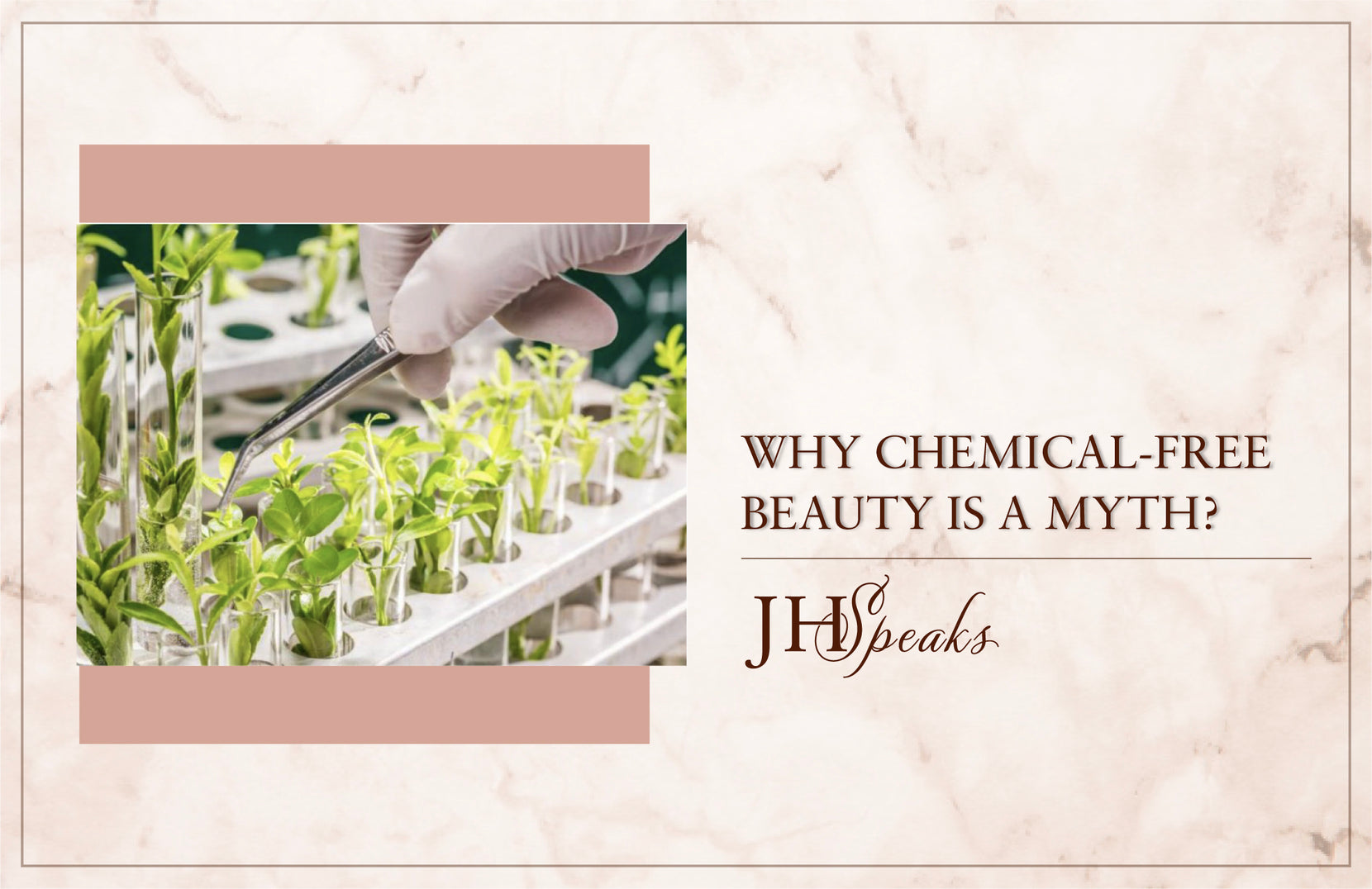The quest for the perfect skincare range is getting complicated for the end-user who wants to embrace the safe and natural alternatives but is lost in the claims of ‘chemical-free beauty’.
While it is judicious to watch out for chemicals that have been proven toxic, it is another thing to fall for products that claim to be ‘chemical-free’. We asked some of the most frequently asked questions to Dr Neena Chopra, Director of Beauty and Technical, Just Herbs to clear the air around chemicals. A biochemist and certified naturopathy expert, Dr Chopra believes in harnessing the best in nature through science.
Here’s decoding where are ‘chemicals’ placed in the universe of clean beauty.

1. Why do we perceive chemicals to be bad for the skin?
People have attached a certain negative connotation to the word ‘chemical’. It is identified with something that is bad or harmful. In reality, everything around us – the Universe, the human body – is made of chemicals. It is an elementary knowledge that water is a chemical compound of hydrogen and oxygen but we’ve never encountered anyone who can call it harmful! So it’s definitely a myth that all chemicals are bad for us.
However, there are certain synthesized or lab-produced chemicals that interfere with the natural function of the body. Also, overusing any chemical has a disturbing effect on the natural proportions of our body. For example, we all have iron in our body and it has certain advantages. If we have an overdose of synthesized iron, it can even lead to seizures. So, all our chemical consumption should be in a well-balanced and proportioned manner.
2. Can you help us understand the role of chemicals in beauty?
Firstly, we need to establish the fact that naturally occurring substances are also chemicals. All the polyphenolic compounds like pomegranate, green tea, etc. are all good for the skin and they are chemicals.
Secondly, chemicals have a pivotal role in the beauty industry. Everything that constitutes a beauty product is nothing but chemicals that have been mixed in certain proportions and have certain remedial effects. If anything contains organic chemicals in permissible amounts or synthetic compounds that don’t interfere with the natural functionality of our human body, there is nothing to be scared of.
3. What is chemical-free beauty?
When people say that a product is chemical-free, they probably mean that it is free of the harmful synthesized chemicals and carries the constituent natural/organic chemicals in permissible proportions. Name any naturally occurring substance, the ones which general public perceives as chemical-free; they are made up of chemicals. Honey contains glycolic acid, apples contain malic acid and even pomegranate contains potassium. Therefore, scientifically speaking, the concept of chemical-free beauty is a myth.
4. What is the difference between naturally occurring chemicals and synthetic ones?
Natural chemicals are simply the ones produced by nature without any human intervention. Synthetic chemicals are made by humans using methods different than that nature uses, and these chemical structures may or may not be found in nature. This effectively means a synthetic chemical can be made from a natural product (i.e. naturally derived). While naturally occurring chemicals come with the fixed composition, the only cause of worry in synthetic chemicals is that their composition can be altered by human interventions. This potentially carries the hazard of interfering with our structure, which is designed to adapt to set-composition of every chemical.
5. Are there any synthetic chemicals which are better and safer than their chemical counterparts?
Absolutely, that depends on the proportional composition of the synthetic chemical. For example, synthetically produced Ascorbic acid or Vitamin C is usually as safe as its natural counterparts. Moreover, the synthetic extract of ascorbic acid allows us to manually fix its composition in a product depending on an individual’s type and one’s degree of acceptance.
“Any naturally occurring substance, the ones which general public perceives as chemical-free; they are made up of chemicals. Honey contains glycolic acid, apples contain malic acid and even pomegranate contains potassium. Therefore, scientifically speaking, the concept of chemical-free beauty is a myth.
Here are some naturally occurring chemicals used in beauty products…

Ellagic Acid
Found in pomegranate, it’s anti-parasitic and antioxidant. Studies have shown that ellagic acid found in a pomegranate can suppress UV-induced skin pigmentation when applied topically or when administered orally, thereby helping in skin fairness. This makes pomegranate a highly useful substance in the beauty industry.

Geraniol
Geraniol is a naturally occurring fragrance compound found in oil-of-rose, citronella oil and in the essential oils of geranium and lemon. It can also be produced synthetically. Geraniol is generally used for its aroma/fragrance purposes.

Glycolic Acid
Glycolic acid is part of the group of active compounds known as AHA’s (alpha hydroxy acids). Derived most commonly from cane sugar; it has the smallest molecules in the group so is able to penetrate the skin deeply and easily, making it the most effective for treating fine lines, acne, blackheads, dullness, oiliness, etc.

Liquorice
Licorice or mulethi is helpful for sensitive skin. Liquorice root contains an active compound called “glabridin.” Liquorice extract may also help diminish the appearance of under-eye circles, discolouration and age spots.

Lactic Acid
Lactic acid is a familiar ingredient in many beauty products because it benefits the skin in numerous ways. It is gentler than most other AHAs and hence, the right strength and PH balance of lactic acid imply that it can be used as a moisturising agent, exfoliant or peel treatment.

Curcumin
Derived from turmeric, it has several anti-inflammatory and anti-antioxidant properties.
To know how to read back labels, head to http://justherbs.in/blog/decoding-ingredients-all-about-parabens/





